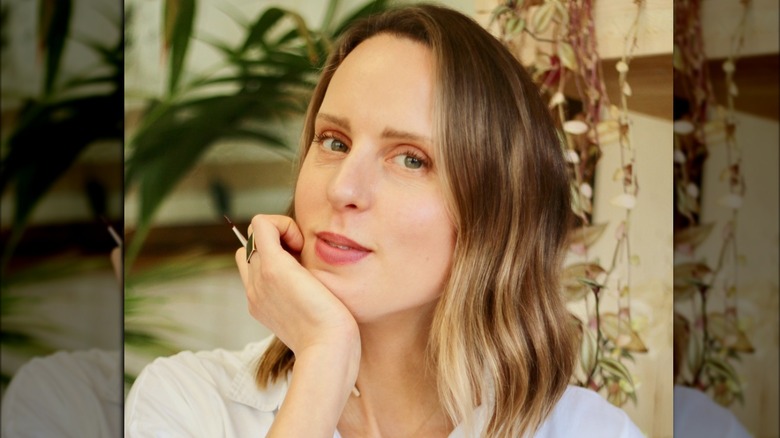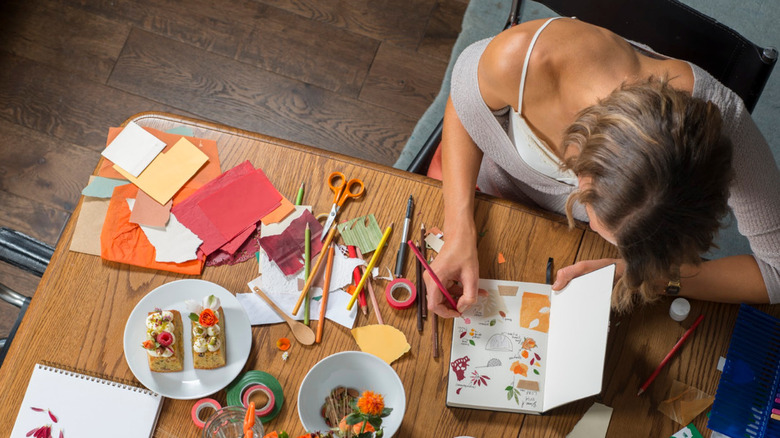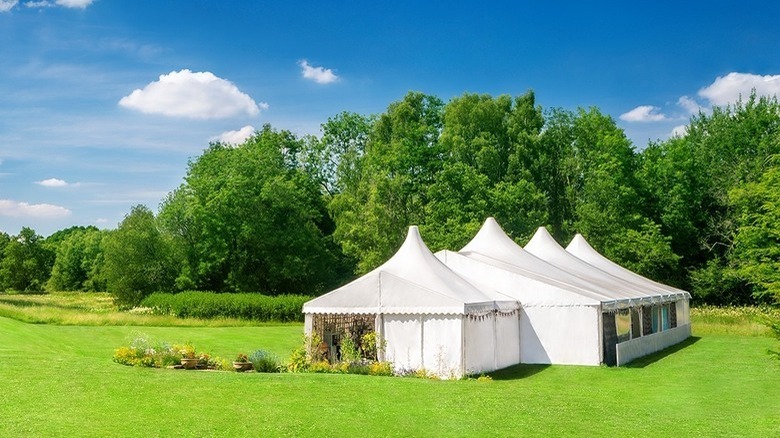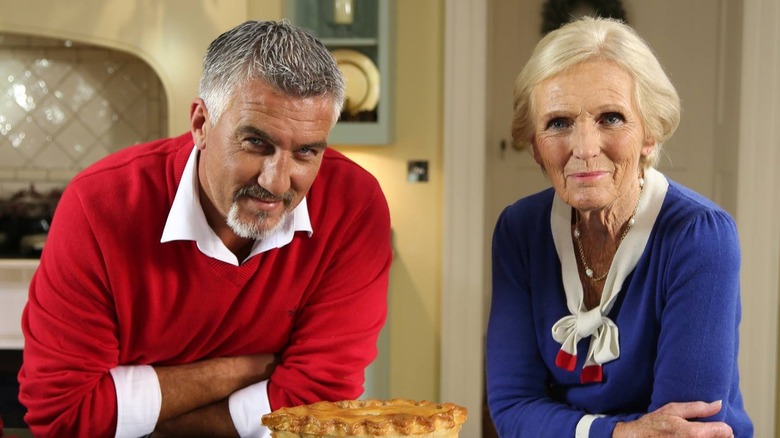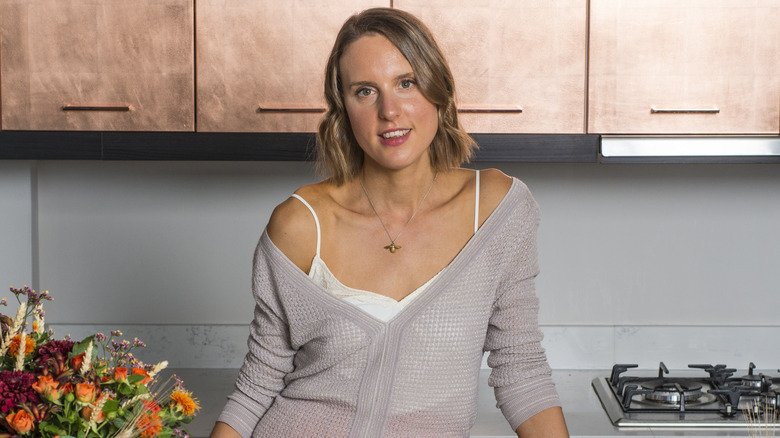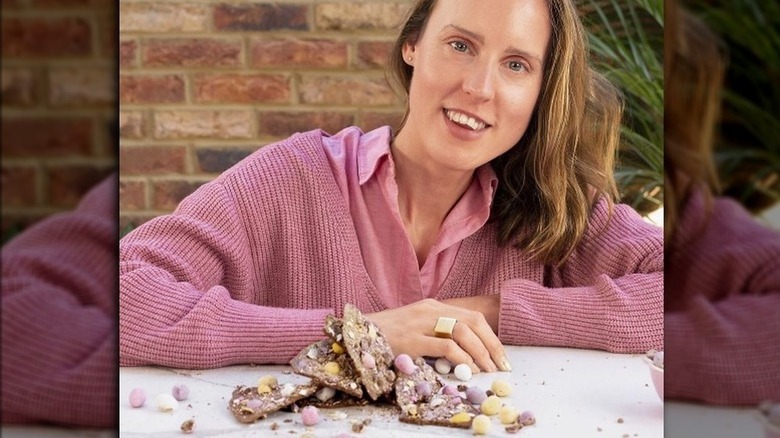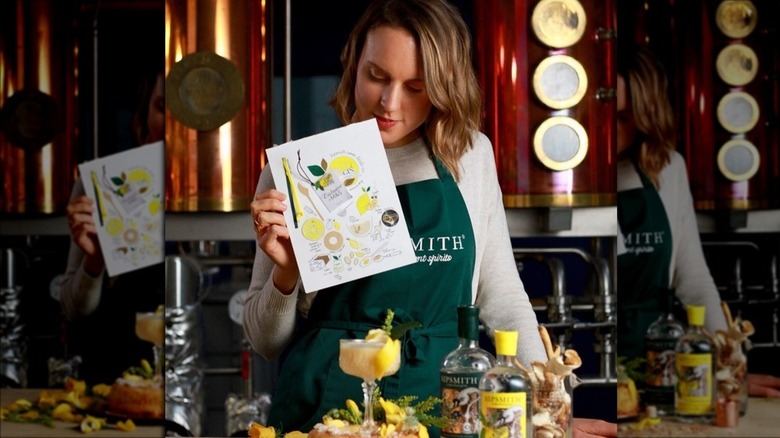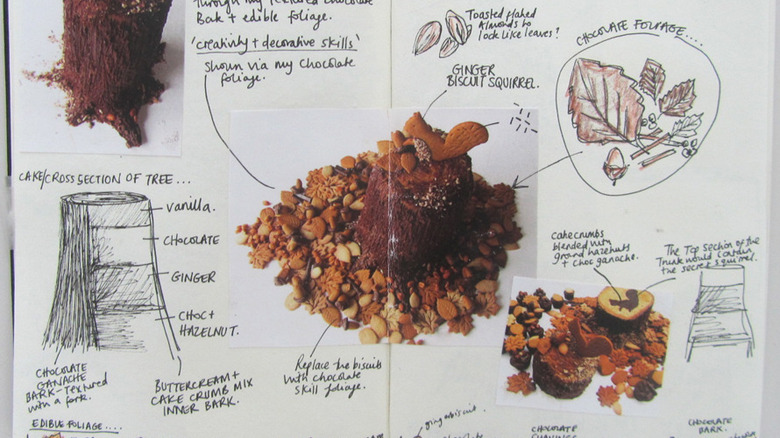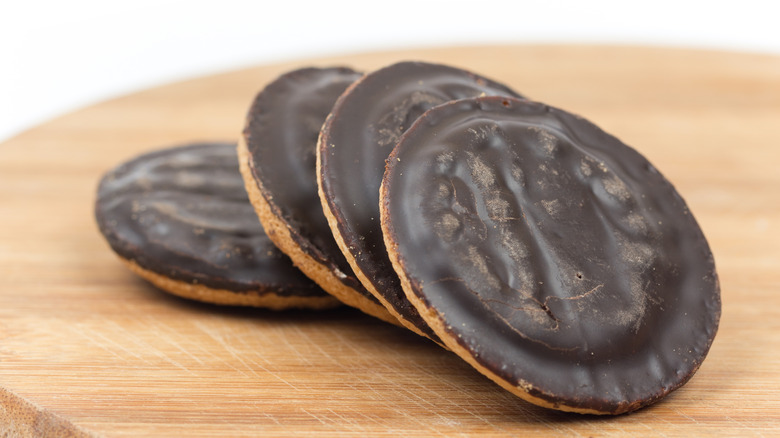Great British Bake Off Winner Frances Quinn Dishes On The Show - Exclusive Interview
We may receive a commission on purchases made from links.
On your marks ... get set... bake! Those are the words baker Frances Quinn heard time and time again in the tent on "The Great British Bake Off." Out of the 12 contestants on the show for Season 4, Quinn ultimately took the crown thanks to her impeccable design skills, eye for creativity, and knack for baking. However, that success certainly didn't come overnight. Quinn has been baking since she was little, honing her at-home baking skills for years before auditioning to compete on the show.
But what was it really like to be on "The Great British Bake Off"? How do they possibly get such elaborate bakes out in such a short amount of time? And how hot is it really in that tent?
We went straight to the source to find out. In an exclusive interview with Mashed, Season 4 winner Frances Quinn shares all about her time on the show, her opinion on the toughest judge, and her top baking tips for bakers just getting started in the kitchen.
Frances Quinn dishes on trying out for The Great British Bake Off and the long hours of filming
Why did you decide to try out for "The Great British Bake Off"?
I'd watched it, but it was actually my colleagues when I was working at Jewels that were putting the application form on my desk. So I didn't actually ... well, I did apply, but I was very much persuaded by friends and colleagues.
Yeah, I just liked the idea of being able to illustrate creative baking, which I'd showed to friends and colleagues. But it was the piles of forms that were lining up next to my desk that made me take the pen and apply.
What's the schedule like for filming? Are you in the tent for hours upon hours?
Yeah. I mean, no one really knew exactly how long the days were going to be. I remember the first weekend, we stayed at hotels about half an hour away from where the tent was. And I remember them saying, "Okay, wake up call at five and you'll be on the, we called it the Baker's mini bus, at six o'clock."
And then you'd get to location around seven. And then you'd obviously have to be mic'd up, and all your equipment would have to be checked. Although the actual challenges ranged between two to four hours, there was a lot of time just in between when they were interviewing everyone. They were long, long days, but the time of the bakes, that just went so quickly. So, so quickly. You just always felt you needed at least another hour.
And everyone was like, "They can't really mean it when they're like, 'That's it, bakers. Only 10 minutes left.'" But it often was like that. I actually, when I'm baking now, I sometimes think, how on earth I did manage to get a cake out in the time that was given?
Frances Quinn reveals what it's really like in The Great British Bake Off tent
What would you say was your most difficult challenge on the show?
Difficult challenge? Was probably ... Do you know what? The time is the absolute enemy on that show because you just don't have a lot of time to bake and cool everything before putting it all together and assembling it all.
Even the first showstopper chocolate cake I made in the first week was difficult because there were so many different elements from putting squirrels inside sponge cakes and making biscuits. But it was just dealing with the different temperature as well because you're in a tent. And every weekend, particularly being over in Britain, the weather is very unpredictable.
And technical challenges when you couldn't even picture what the bake needed to look like. Yeah. It's funny. The first pastry week was my absolute nemesis, but I actually got star baker in the last pastry week. But yeah, it was time and fridge space that was the technical challenge.
What was the most challenging part of baking in the tent? Obviously the heat, but were there other challenges with so many people in the same tent?
So many people. Yeah, so many people. And just also having to also be interviewed while also trying to bake and then having Mary and Paul and Mel and Sue. I was so used to just baking at home in the kitchen with the radio on and just almost using it as a form of downtime, whereas there, it was full-on adrenaline. Not a lot of time. Dealing with lots of questions being chucked at you. And the amount of cameramen and just people around you was very different from my own kitchen at home where it was a much more relaxed pace.
Frances Quinn dishes on the toughest Great British Bake Off judge and her proudest moment
What bake would you say you are most proud of from the show? If you had to pick one.
I would probably say the secret squirrel cake. I think that was my first bake. And I think it illustrated my creativity. And they were really pleased with it at the end. Because there were some bakes that something just went wrong along the way, like my biscuits tower collapsing.
And then I guess, I did the vegetable little canapes. And that won me the Hollywood handshake with my cauliflower cheese scone. So I'm definitely proud of that, but I think it was the secret squirrel cake that make my rep, and people started to know me for. It was like, "Oh, it's the secret squirrel lady." And yeah, so I have a fond memory of that.
Who would you say was the toughest judge on the show?
In my opinion, probably Paul. Yeah. Paul was the toughest judge ... When he liked your bread, that was a big thing. Because I felt Mary was cake, Paul was bread, and they came together on pastry. But yeah, it took a lot to win over Paul. So getting a handshake from him was a big day.
Frances Quinn reveals her top baking tips
What are the top three items that you would say every baker should have in their kitchen?
I would say a set of digital scales. They're really handy to have. In fact, I even took my own along to "Bake Off" in the tent. A pen or a pencil is really useful just for obviously writing down recipes or even ideas you get in the kitchen. And then, I'd say a microplane zester. They're just really good at zesting lemons and oranges for lemon drizzle cakes but also when I make my orange blossom marzipan, like I did the little bees. It's just a really great zester for getting really fine zest and quickly.
Can you share some baking tips for people who perhaps are just beginning in the kitchen or getting into baking?
I think, like I said, you don't have to complicate everything, and sometimes it's good with starting with a basic recipe. I took that approach when I did my cookbook because it's the idea of having a basic say lemon sponge or a basic flapjack mixture. And then you can ring the changes with different flavoring. So like putting orange zest in a flapjack, or using different types of sugar in your sponge.
So just getting one recipe you like, and then you can ring the changes with the flavorings that you're adding in. And then often, a really simple but good, basic recipe for if you're doing a Victoria sponge, is that say you weigh your eggs because eggs all have different weights. While a recipe may call for two eggs, but that may be large eggs or small eggs. So if you're doing just a basic sponge, if you weighed your eggs in their shell, so three eggs, and then the weight you have with that says 150 grams is going to be the weight you use for the sugar, the butter, and the flour. So it's an all-in-one sponge, but you can basically then adapt that to what the weight of the eggs is.
And then if you are doing a sponge, this was a tip my grandma said. If you add a little bit of just-boiled water from the kettle in the final bit, just to fold in after you've added the flour, it just makes the sponge extra light. And I would say sometimes when you're making biscuits, I would always roll the dough out onto your non-stick parchment paper, and then you can cut the shapes and just peel back the dough. So you then don't have to move the biscuits onto another sheet. They're already on the baking paper itself.
But yeah, it's just trying and just enjoy being in the kitchen and don't feel too intimidated by it. And that just comes from practice. And also, try not to bake when you're in a bad mood because it never normally comes out very well. I've always got a baking playlist. I have some music on, have the radio on. I have a podcast. And learn from your mistakes as well. Like I always say, unless it's absolutely burnt to smithereens, biscuits that are slightly bronzed or have lost their shape, they can be crumbled up and used on top of ice cream sundaes. I've always got bags of biscuit crumbs and cake crumbs in my freezer just to recycle and reuse. Don't get disheartened when things go wrong. You always learn from your mistakes.
Frances Quinn shares how she first learned to bake
How did you first learn to bake? What was your journey like?
Well, I'm the youngest of five. So, there were lots of mouths to feed in the kitchen. And for me, the kitchen was an extension of the living room and playroom. So I never felt intimidated in there. So my mum was very ... I could open the cupboards and make flapjacks, which was probably one of the first bakes I made. I think in America, flapjack is a bit more like a scone. Or whereas a flapjack here it's like an oatie tray bake.
I was always able to go in there and bake. I got confidence through doing that. And my dad had a bookshop. And so, I used to love reading the books like Matilda with the Bruce Bogtrotter chocolate cake. And there was obviously the cookbook section and then the children's book section. I initially thought I wanted to be a children's book illustrator. And then it was doing design. I did a textile design degree. And it was really going to work for Jewels as their baby toddler designer, and they were wanting someone to be putting recipes on the blog. But baking really started just at home. And just, yeah, making simple things from flapjacks. That was where my confidence with it all grew.
Frances Quinn shares where she looks for inspiration
Whether it's celebrity chefs, cookbook authors, or pastry chefs, who do you look to for inspiration?
I love Yotam Ottolenghi. I think his approach to food and baking and cooking is really inspiring. I love Heston Blumenthal for his imagination. And I love actually watching the Bon Appétit team over in America. And Christina from Milk Bar as well.
Do you have a favorite homemade dessert? What's your all time go-to for whether it was something you grew up with or something that you like to bake most often?
I suppose I go between sticky toffee pudding, which my uncle makes a really good sticky toffee pudding, which is a really rich date sponge covered in a caramel-y date syrup, and then my mum always does a really good trifle at Christmas. And then, I also just love a crumble, an apple and blackberry crumble is delicious.
Frances Quinn dishes on the importance of visually appealing baked goods
With a background in design, why is it important to you to make something that's both visually satisfying and delicious when it comes to creating a bake?
Well, obviously, people say you eat with your eyes. But I like also the playful interpretiveness that some of my bakes can bring. Like when I did the hidden carrot cake, making soil be made out of chocolate sponge cake crumbled up, or I did a giant sandcastle that was an inside out cheesecake. Because in my mind, sand looks a bit like biscuit crumbs.
I'm always seeing the connection between inedible and edible things through texture. And also, I love playing with words. So that's when say, I did some gingerbread nuts and bolts to go in a tool kit. So it's using mixed nuts and then biscuits in the shape of different nuts and bolts. And it's that layering up of craftsmanship. I love to have a studio lab where you're able to overlap the different crafts. So having say, a potter, sit next to a baker because I see dough and clay being quite similar in the fact that they are baked to high temperatures. So you could bake bread in the kiln and you could put different washers on it. And then you could have a jewelry designer sit next to a chocolatier. It's that craftsmanship and allowing people to see that it doesn't just have to come under one bracket. And that all the different crafts can overlap. And if you can eat the end design, then even better.
You also have a reputation for absolutely beautiful cakes. What is your favorite edible flower to decorate cakes with?
Oh, I would probably say even just rose petals are beautiful, because they can be both used fresh with maybe a bit of sugar, but also dried they're beautiful. I even sometimes as well, I've been making roses out of mango that you just coil up.
And I sometimes just like using fresh flowers that aren't necessarily edible, but just to decorate on a pavlova or a cake that you'd remove once it's being served. But yeah, I'd probably say some of the rose petals.
Frances Quinn shares how she won a Guinness World Record
You won a Guinness World Record for a giant Jaffa cake. Why did you set out to achieve that goal?
Yeah, it causes a lot of controversy because obviously it's called a Jaffa Cake, but it's found in the biscuit aisle. And it is more seen as a biscuit, but it's basically a bit like a round, fatless sponge with then there's some orange jelly covered in dark chocolate.
I was invited to go on a radio program where they were debating whether it was a cake or a biscuit. And I had made a giant one before, but more the size of a dinner plate. Nothing like the size we went on to do. So it was the producer of the show [who] was like, "Why don't we try and maybe break the Guinness World Record for making the biggest Jaffa Cake?"
And so yes, we achieved it. And then I also then went on to make the Guinness World Record jam-filled biscuits. We also have a biscuit called a Jammie Dodger over here, which is a bit like a shortbread biscuit with a jam filling. So I did the Grand Slam Jammie Dodger around the same time as Wimbledon was on in the shape of a tennis racket. So yeah, I have a reputation for biscuits, both big and small.
You can find many of Frances Quinn's favorite recipes in her book "Quintessential Baking" and keep up with her kitchen creations by following her on Instagram.
